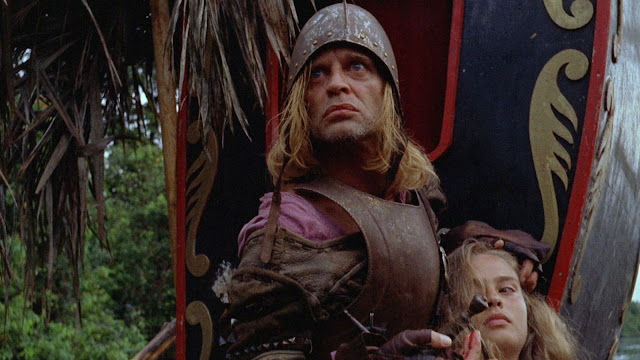Aguirre: The Wrath of God
I am the wrath of God. Who else is with me?
SPOILERS!
Don Lope de Aguirre says little but it is clear he is mad. You can gaze into his sunken orbits, irises clear and distant. His is an angular face that usually appears expressionless. All the more disturbing. He's never first in command, but he's driving the mad mission through the jungles and rivers of South America. A doomed journey in search of El Dorado, far from the Andes mountains, from which many Spaniards and indigenous slaves descend after the defeat of the Incan Empire in the sixteenth century. To the end, Aguirre believes he is headed toward power and riches.
He convinces many others after he stages a mutiny against leader Don Pedro de Ursua. Several of the forty on this mission - sent by Gonzalo Pizzaro - are too intimidated to disagree. Writer/director Werner Herzog's 1972 AGUIRRE: THE WRATH OF GOD, an epic film without the need for an epic running time, details this heart of darkness voyage in nearly unexplainable fashion. As if a documentary were being shot, yet with many astounding artistic choices. It is well known that Herzog led his actors and crew through the punishing Amazon, rumored to have hypnotized them and even pulling a gun on Kinski, with whom he had a highly tempestuous relationship. Nonetheless, they collaborated again several times. Whatever behind the scenes horror unfolded, it served this film well. It is one of the most haunting pictures I've seen.
I will not forget images of a young girl's dying eyes. Or of starving men counting kernels of corn as their figurehead, de facto expedition leader gorges on fruit and fish inches away. A horse as it gazes at a raft of survivors one final time. A gaggle of monkeys. There are dozens of startling images in AGUIRRE, set to the minimal scoring of Popol Vuh. It's all mesmerizing. Easy to understand how influenced Coppola was for his jungle opus, APOCALYPSE NOW.
You can discern from my synopsis the wealth of themes Herzog explores. His screenplay embelishes history a fair amount, but these characters are based on real individuals, though perhaps excepting the missionary Brother Gaspar de Carvajal, who does not exhibit a Christlike response when the natives react to a Bible he offers them. On a somewhat related note, AGUIRRE has fluorishes of humor, some unexpected. Interestingly, much of it involves the arrows flung by hostile natives. Mostly, the film maintains a hushed desperation, a trippy vibe that nonetheless feels sober.
By the end of the film we reach Aguirre's famous speech, delivered to many, though not humans. Like his downed men, he's feverish and delusional, but "fortune smiles on the brave and spits on the coward." Can we finally judge Aguirre as "brave"? Just foolish?



Comments